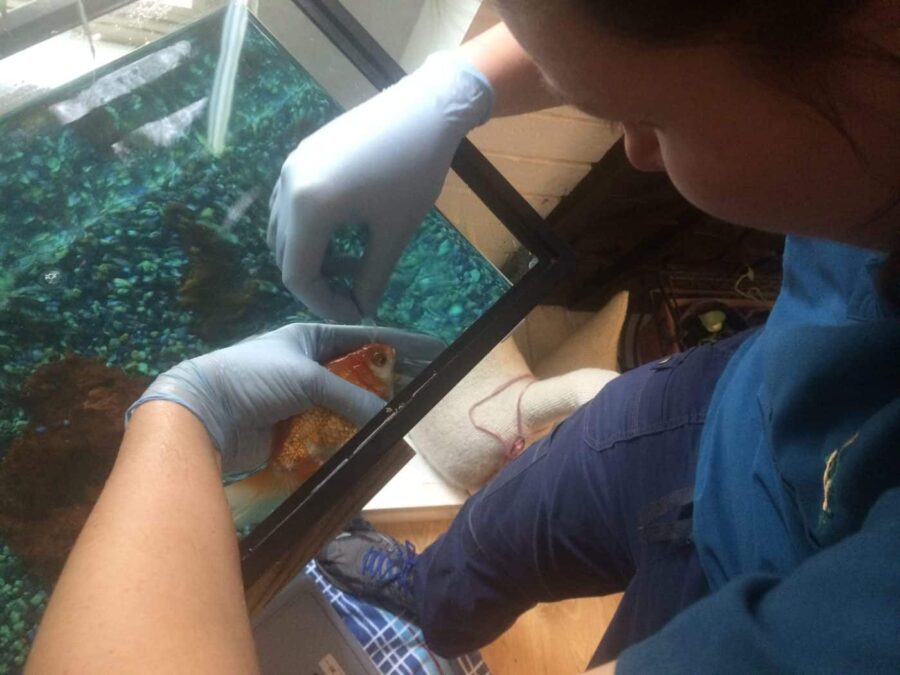
It’s time to dive into the fascinating world of fish veterinary medicine! As a fish veterinarian myself, I can’t help but acknowledge that our niche is indeed minuscule. In fact, aquatic veterinarians make up only a mere 0.2% of the total veterinarians in the USA. However, what’s even more surprising is that the biggest hurdle we face is not lack of expertise or passion, but rather the simple fact that no one knows we exist.
No one knows we exist
Let’s face it: veterinarians are not known for their marketing prowess. I, too, was once oblivious to the power of marketing until I started my own company. It took time and effort to build this skill, but the truth is, most people already know what a “veterinarian” does. Even small children can tell you that a veterinarian takes care of sick animals and makes them better.
But what about a “fish veterinarian”?
The moment I mention this, confusion fills the room. Conceptualizing what a “fish veterinarian” does is exceedingly difficult for the average pet fish owner. In fact, it’s so uncomfortable for me that when I’m on a plane and someone asks about my profession, I often resort to saying I’m an accountant just to avoid the confined confrontation without an internet connection to showcase our website or videos.
So, how do we fix this?
Spreading the word through videos
One of the ways we have been able to bridge this awareness gap is through videos. We’ve created engaging content that showcases the work of fish veterinarians, like our favorite lemon fish named Lemon and our on-location pond checkup videos, where you can witness my amazing fish-catching skills firsthand.
If you’re hungry for more amazing fish videos, I highly recommend checking out my Australian colleague, Dr. Richmond Loh’s video channel. It’s a treasure trove!
These videos, along with countless others on our channel, help illustrate the crucial work that fish veterinarians do. It’s a step in the right direction, but there’s still more to be done.
Who do you turn to when your fish is sick?
If your fish falls ill, who do you seek for help? Well, you might be surprised to know that the top three answers on the board are: flush it, rely on Dr. Google, or consult a pet store. Noticeably missing from this list is a veterinarian. Why? Because pet fish are often considered “disposable” pets.
In the past, even cats and dogs weren’t deemed worthy of veterinary care because they didn’t serve any significant purpose. It’s only recently that exotic animals, reptiles, and other pocket pets have become recipients of proper veterinary care. As a child, if your hamster was sick, you simply replaced it with another one. Fortunately, times have changed.
However, fish still remain a challenging group to advocate for. While pet fish owners undoubtedly see the value in seeking veterinary care for their beloved aquatic pets, the general public struggles to understand the importance of fish healthcare. Moreover, the aquaculture industry, which houses countless fish, is widely misunderstood and often subjected to negative perceptions fueled by the media.
To truly grasp why fish deserve veterinary care, it’s essential to take the time to research and understand the complexities of aquaculture and fisheries. These fish may not be your pets, but they too deserve the benefits of quality veterinary care.
Promoting fish veterinary medicine
So, what can we do to promote fish veterinary medicine? As a passionate advocate for this field, I will continue being as vocal as possible. Through my company, I will post helpful content and see as many patients as I can. We’re even planning to produce another video series, showcasing more exciting “on-the-road calls.” Additionally, I’m in the midst of writing a book series, which I hope to complete by our 7th anniversary.
In 2020, I have the honor of leading the American Association of Fish Veterinarians as their President. It’s an opportunity for me to give back to the organization that has supported me immensely throughout my career. We are also excited to participate in the national AVMA conference for the first time, bringing awareness of aquatic veterinary medicine to a larger group of veterinarians.
However, I have a simple request for you: after reading this article, please take a moment to tell at least one person that fish veterinarians exist and are here to help our finned friends. Whether they are pet fish, part of an aquaculture industry, or raised for stocking in a fishery, it’s time to recognize the value of fish veterinary care.
Thank you for being part of this journey and for spreading the word about the incredible work that fish veterinarians do.
Visit HOT NEWS DAY to learn more about the fascinating world of fish veterinary medicine.
Other Articles You Might Like
- “My fish only cost a few dollars; why does he deserve veterinary care?”
- Why A Fish Vet?
- A “Typical” Day in the Life of a Fish Vet